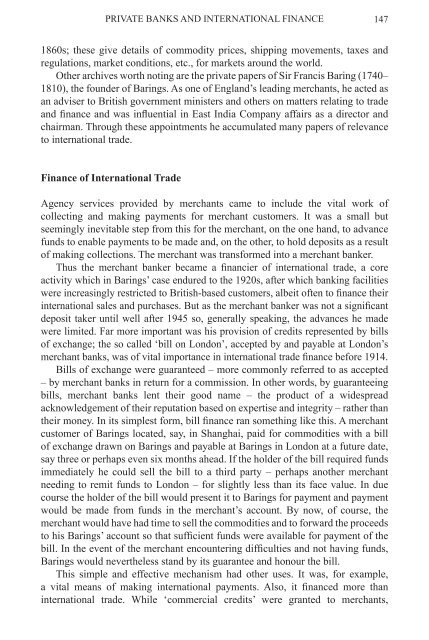the world of private banking
the world of private banking
the world of private banking
Create successful ePaper yourself
Turn your PDF publications into a flip-book with our unique Google optimized e-Paper software.
PRIVAtE BANKS AND INtERNAtIONAL FINANcE 147<br />
1860s; <strong>the</strong>se give details <strong>of</strong> commodity prices, shipping movements, taxes and<br />
regulations, market conditions, etc., for markets around <strong>the</strong> <strong>world</strong>.<br />
O<strong>the</strong>r archives worth noting are <strong>the</strong> <strong>private</strong> papers <strong>of</strong> Sir Francis Baring (1740–<br />
1810), <strong>the</strong> founder <strong>of</strong> Barings. As one <strong>of</strong> England’s leading merchants, he acted as<br />
an adviser to British government ministers and o<strong>the</strong>rs on matters relating to trade<br />
and finance and was influential in East India Company affairs as a director and<br />
chairman. Through <strong>the</strong>se appointments he accumulated many papers <strong>of</strong> relevance<br />
to international trade.<br />
Finance <strong>of</strong> International Trade<br />
Agency services provided by merchants came to include <strong>the</strong> vital work <strong>of</strong><br />
collecting and making payments for merchant customers. It was a small but<br />
seemingly inevitable step from this for <strong>the</strong> merchant, on <strong>the</strong> one hand, to advance<br />
funds to enable payments to be made and, on <strong>the</strong> o<strong>the</strong>r, to hold deposits as a result<br />
<strong>of</strong> making collections. The merchant was transformed into a merchant banker.<br />
Thus <strong>the</strong> merchant banker became a financier <strong>of</strong> international trade, a core<br />
activity which in Barings’ case endured to <strong>the</strong> 1920s, after which <strong>banking</strong> facilities<br />
were increasingly restricted to British-based customers, albeit <strong>of</strong>ten to finance <strong>the</strong>ir<br />
international sales and purchases. But as <strong>the</strong> merchant banker was not a significant<br />
deposit taker until well after 1945 so, generally speaking, <strong>the</strong> advances he made<br />
were limited. Far more important was his provision <strong>of</strong> credits represented by bills<br />
<strong>of</strong> exchange; <strong>the</strong> so called ‘bill on London’, accepted by and payable at London’s<br />
merchant banks, was <strong>of</strong> vital importance in international trade finance before 1914.<br />
Bills <strong>of</strong> exchange were guaranteed – more commonly referred to as accepted<br />
– by merchant banks in return for a commission. In o<strong>the</strong>r words, by guaranteeing<br />
bills, merchant banks lent <strong>the</strong>ir good name – <strong>the</strong> product <strong>of</strong> a widespread<br />
acknowledgement <strong>of</strong> <strong>the</strong>ir reputation based on expertise and integrity – ra<strong>the</strong>r than<br />
<strong>the</strong>ir money. In its simplest form, bill finance ran something like this. A merchant<br />
customer <strong>of</strong> Barings located, say, in Shanghai, paid for commodities with a bill<br />
<strong>of</strong> exchange drawn on Barings and payable at Barings in London at a future date,<br />
say three or perhaps even six months ahead. If <strong>the</strong> holder <strong>of</strong> <strong>the</strong> bill required funds<br />
immediately he could sell <strong>the</strong> bill to a third party – perhaps ano<strong>the</strong>r merchant<br />
needing to remit funds to London – for slightly less than its face value. In due<br />
course <strong>the</strong> holder <strong>of</strong> <strong>the</strong> bill would present it to Barings for payment and payment<br />
would be made from funds in <strong>the</strong> merchant’s account. By now, <strong>of</strong> course, <strong>the</strong><br />
merchant would have had time to sell <strong>the</strong> commodities and to forward <strong>the</strong> proceeds<br />
to his Barings’ account so that sufficient funds were available for payment <strong>of</strong> <strong>the</strong><br />
bill. In <strong>the</strong> event <strong>of</strong> <strong>the</strong> merchant encountering difficulties and not having funds,<br />
Barings would never<strong>the</strong>less stand by its guarantee and honour <strong>the</strong> bill.<br />
This simple and effective mechanism had o<strong>the</strong>r uses. It was, for example,<br />
a vital means <strong>of</strong> making international payments. Also, it financed more than<br />
international trade. While ‘commercial credits’ were granted to merchants,












![[Pham_Sherisse]_Frommer's_Southeast_Asia(Book4You)](https://img.yumpu.com/38206466/1/166x260/pham-sherisse-frommers-southeast-asiabook4you.jpg?quality=85)



